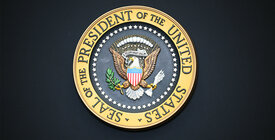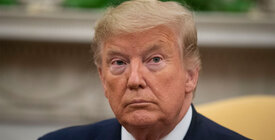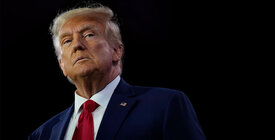You’re reading The Briefing, Michael Waldman’s weekly newsletter. Click here to receive it in your inbox.
“In America,” Thomas Paine wrote at the founding, “the law is king.” The Supreme Court is now being called upon to affirm that principle.
Next week, Donald Trump will go on trial in New York City, where he is accused of a scheme to cover up hush money payments to a porn star as part of a bid to save his 2016 campaign. Trump faces dire legal peril. Manhattan District Attorney Alvin Bragg is a serious prosecutor, and this is a serious prosecution. But it wasn’t supposed to be the first.
That was supposed to be the federal trial, originally scheduled to start March 4, about Trump’s drive to overthrow the 2020 election and block the peaceful transfer of power. Trump claims he is immune from prosecution as an ex-president. That’s a nonsensical argument, one the justices could have quickly dispatched. Instead, they have stalled.
On Monday, the Brennan Center filed a friend-of-the-court brief representing 15 top historians of the founding era, including Holly Brewer, Joanne Freeman, Jill Lepore, Jack Rakove, and Rosemarie Zagarri. These scholars make clear how important this issue was in the drafting of the Constitution.
“Sometimes history speaks ambiguously,” they write. “But here, it speaks with surpassing clarity: The principle that a President may be prosecuted — which informed President Nixon’s 1974 pardon and President Clinton’s 2001 plea bargain — began in the beginning. As James Iredell, one of this Court’s inaugural justices, explained, ‘If [the President] commits any crime, he is punishable by the laws of his country.’”
As the scholars note, the principle that presidents can be prosecuted has been affirmed repeatedly. Among many examples, Special Counsel Jack Smith’s brief pointedly cites Brett Kavanaugh, who argued before becoming a justice that ex-presidents could be prosecuted. Often the Supreme Court hears achingly hard cases. This is an easy one.
And in big cases where the presidency is at stake, the Supreme Court has shown that it can act fast. In U.S. v. Nixon in 1974, the Court took just two weeks to rule that the president had to turn over his Oval Office tapes. Two weeks after that, Nixon resigned.
In 2000, Bush v. Gore took three whole days to resolve.
Other epic rulings involving the presidency happened fast. The 1952 Youngstown Steel case, which set out the limits of presidential power, was heard days after President Harry Truman seized steel mills during the Korean War. The Court ruled against Truman just three weeks later.
This Supreme Court has already given Donald Trump what he craved most: time. Smith first asked for the justices to get involved last December. Instead, they stayed their hand, and the DC Circuit Court of Appeals unanimously ruled against Trump. Rather than affirming that ruling, or unfreezing the trial, the Court will only hear the case on the very last day set for oral arguments this term, April 25. All the while they purr that they are acting in an “expedited” manner.
Voters have a right to know if they are being asked to elect someone who is guilty of the most serious crimes that a president could commit against democracy itself. Indeed, that’s the very argument Trump made when he asked the Court to quickly rule that a Colorado court could not bar him from the ballot.
I discussed these issues with NYU Law professors Melissa Murray and Andrew Weissmann in a Brennan Center Live event that premiered on our website today. The indictment of a former president, Murray noted, “is an extraordinary action to take, but it is also provoked by extraordinary conduct.”
The justices have already done great damage. They engineered one of history’s most egregious political interventions — not with an ugly ruling, at least not yet, but by getting “the slows.” At the very least they should issue this ruling in three weeks. That would give trial judge Tanya Chutkan enough time to start the trial, if barely.
In our nation, the law must still be king. And presidents cannot be cloaked in the immunity of monarchs.







